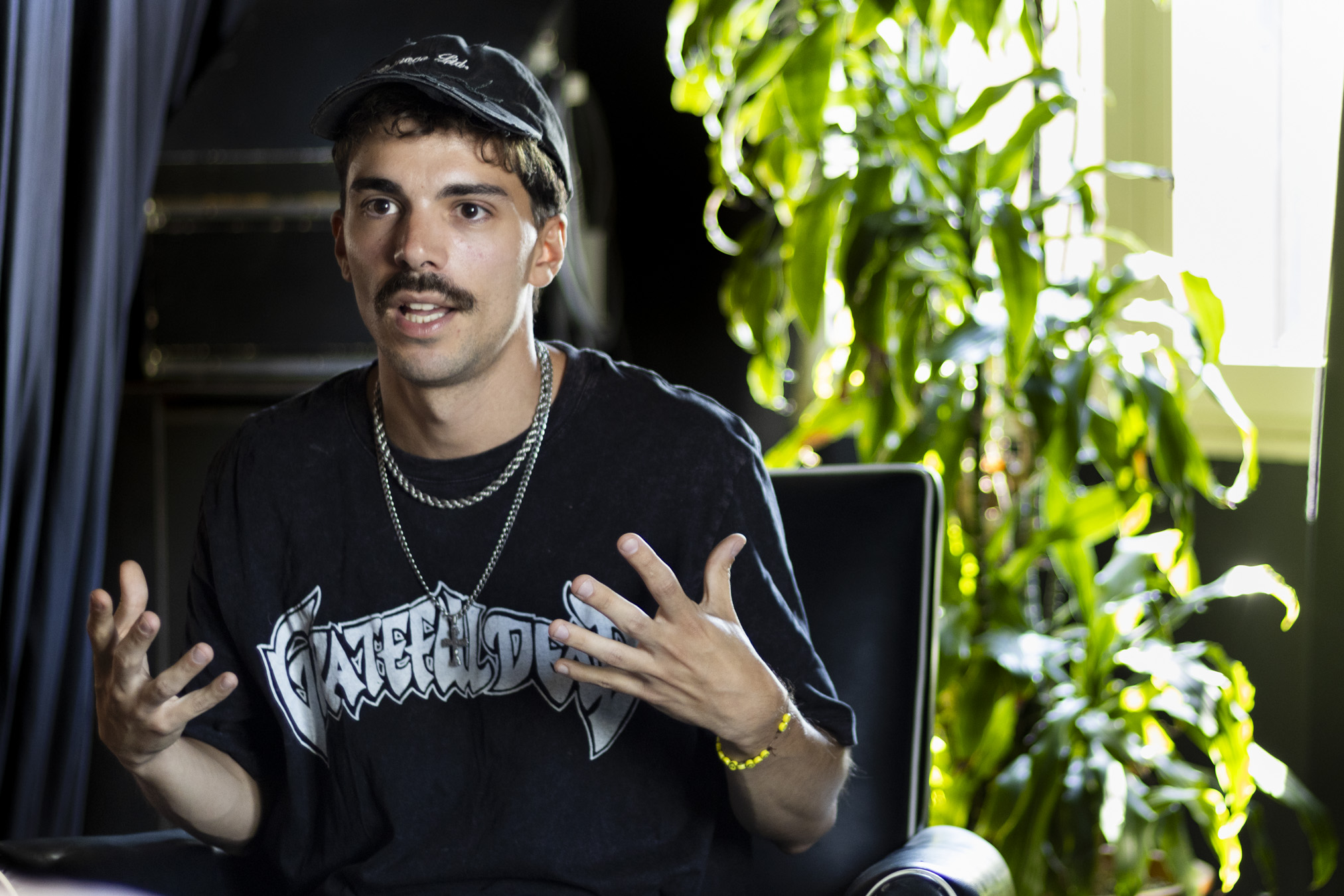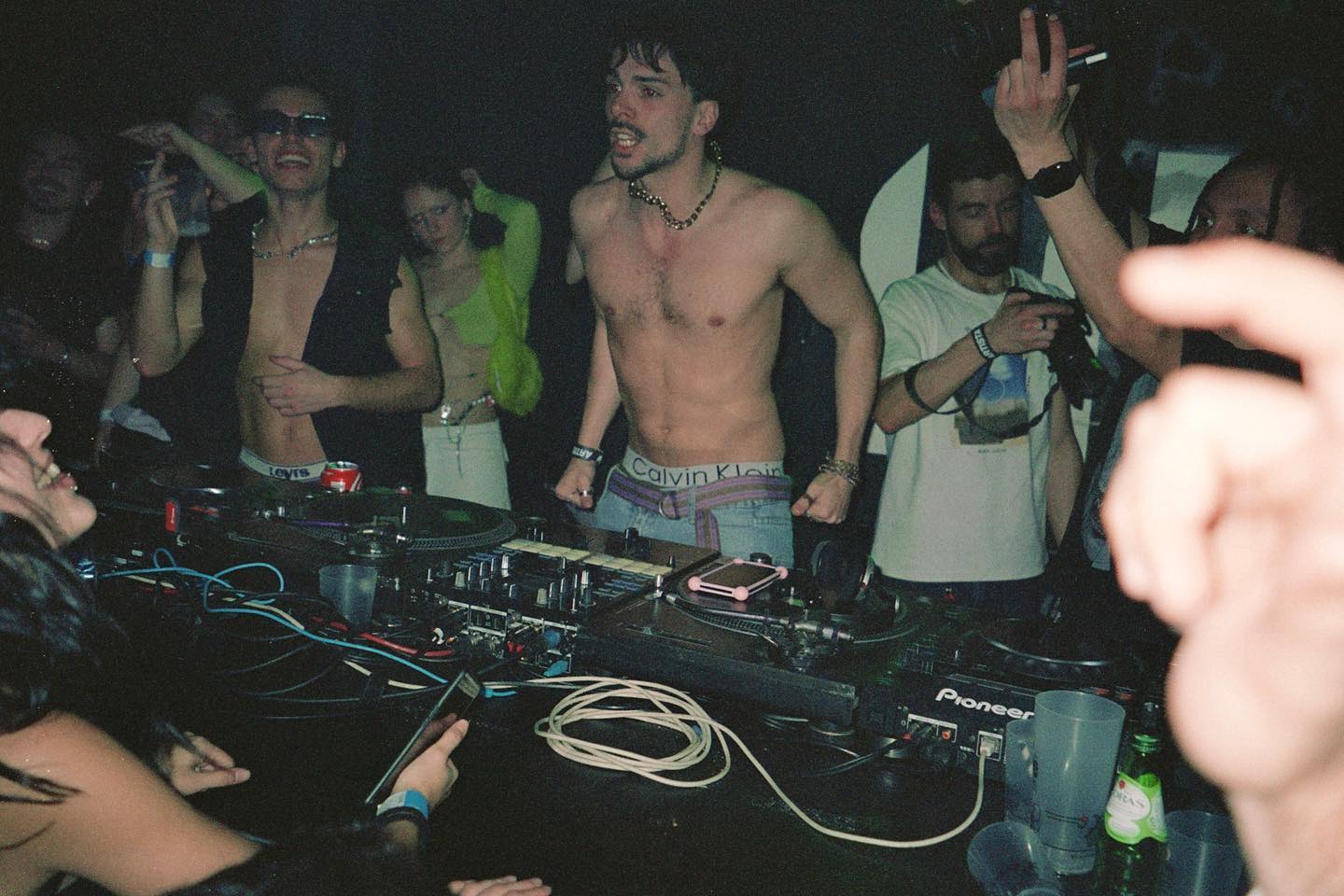EN

You can't talk about Peter Castro without first listing all the hats he wears. He is a founding member of the Pyrats collective, responsible for the city's biggest parties: Beyoncé Fest's tribute to divas, Hollaback's throwback to the 00s, Baddies' empowerment or Batidão's baile funk. He advises crowds on emotional and scatological dilemmas with the character of Dr Love, on the web and live. Along the way, he wrote a book about the 1920s, worked in a warehouse in Bristol and completed a degree in cinema. We went to find out what pushes someone to ‘flex’ in so many areas.
We met Peter at Maus Hábitos, which is practically his second home these days. On the day of Dr Love's live show, the usually foggy and dense concert hall with its shared air is illuminated by a summer sun and wafted by a breeze that only a fourth-floor room at the top of a hill can have. About this profusion of roles and projects, he summarises that ‘I've always had to be producing something, ever since I was a child. Sometimes I have to police myself so I can stop, I'm always creating something, no matter how small.’
When asked if he sees himself as a renaissance man, Peter's answer is quick: ‘a man of the new renaissance, perhaps.’ This isn't about an obsession with what's latest or trendiest, because he himself confesses to a devotion to history: ‘I don't believe that history repeats itself, but I do think that humanity reacts in similar ways to similar events. There are always cycles that repeat themselves. And history turned out to be a crutch during the pandemic: ‘I studied the Spanish flu, how societies and people reacted, and that was something that calmed me down a lot.’

That period, the 1920s, ended up generating a special fascination: ‘The 19th century ended there, it was falling apart and there was a huge global shock. Many things were born out of this shock: the cinema, aviation, the personal car, the motorway, the radio. Women's emancipation and the first discussions about LGBT communities take place in the 1920s, it's fascinating.’ This dive into history via the Spanish flu was part of the therapy to deal with the pandemic. Another big part of that therapy was Peter Castro TV. For someone who ‘always has to be producing something’, the prospect of lockdown was daunting. So the idea arose to start making short skits for a so-called TV channel. Playing all the characters, Peter did the weather, political analysis, soap operas and, yes, love advice. At a time when we were all content creators, these artefacts were shared on Instagram - a tool that Peter had long used to publicise his production companies' parties (before Pyrats, he was also in with the Thug Unicorn collective's crowd).

© Andreia Merca
Today, he speaks of Dr Love with humility, calling him ‘an epiphenomenon that was created in contact with the public’. ‘This character comes from a place without any pretentiousness, I always start by saying that I'm nothing there: neither a psychologist, nor a doctor, nor a coach. I talk to people as if I were talking to my friends.’ So he says he doesn't feel any burden of responsibility with the advice he gives, since he hardly sees Dr Love as a character - ‘that's me, I talk like that. And I share what I think, whether it's right or wrong. Sometimes I just say shit. And that's good, because it's also good to show people that I'm not there to be infallible’.
The mechanics of Dr Love's ‘consultations’ are simple: the audience asks anonymous questions about sexuality and feelings - on Instagram, by message, live, through written notes collected before the show starts - and Peter responds, without complexes, with his opinion. The questions range from etiquette issues during oral sex to doubts about whether a partner's behaviour might indicate emotional manipulation or bullying. There is a ‘Maria magazine’ mystique here, which Peter himself recognises, and which ultimately has to do with the fact that ‘these are topics that in this country are still very refractory. The Portuguese are still very attached to certain stigmas created by Judeo-Christian culture. Latin countries in general have a certain psychosis about sex, because on the one hand they breathe sensuality, but on the other they have the stigmas of shame, of sin.’
The question of responsibility ends up having a certain nuance. Because Peter wants to help create a little ‘sense’: ‘I remember as a teenager everything was a horror, everything was very serious, emotions were very heavy. So here I also take the opportunity to help teenagers demystify certain things, and always appeal to safe sex.’ Not that demystification is only a need for teenagers: ‘older people also find it very difficult to talk about sex, and that has to stop. It's a paranoia that destroys relationships and marriages’. She says that she has already received messages from couples saying that the advice has helped them, and ‘sometimes with microscopic things, you know? For example, having sex standing up. It's basic, it's absolutely basic, but it's a novelty for many couples who don't take the risk’.
He's often criticised, as you'd expect when dealing with these topics. But it doesn't bother him at all, because from an early age he didn't worry at all about how he was perceived: ‘I remember my grandfather, and some of the punk attitudes he had that I thought were fantastic. He was a completely normal bloke from Gaia, but he had a punk soul. He didn't mind Christmas, because he could ‘eat cod whenever I feel like it’. If someone wished him a happy birthday, he would say that ‘congratulations go to babies, not dying men’. And he might decide not to even go to a friend's funeral, because ‘he's not going to mine either’.’

Despite all the intense activity he carries out in the city of Porto, he still has a fondness for his hometown, Gaia. And when he talks about the two cities, he is (as always) uncomplicated: ‘Gaia is the dormitory for the people who make Porto. Because few people live in Porto, this city is worked on by people who live in Gaia.’ He summarises: ‘Gaia is a nest, you know? It's a place where there's calm, where there's serenity. It's a suburb, very quiet.’ Even so, Porto is the city where everyone goes to flex: ‘Porto is where life happens.’
by Ricardo Alves

© Andreia Merca
Share
FB
X
WA
LINK
Relacionados


